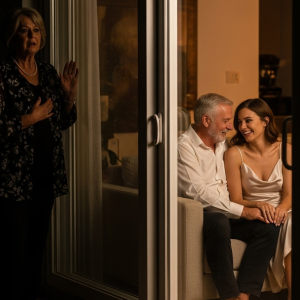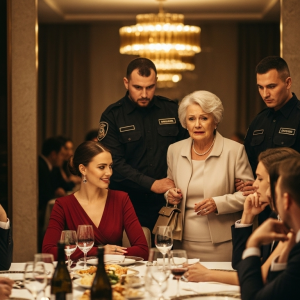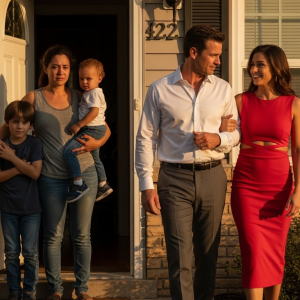My name is Bella, and I never thought I’d be standing on my parents’ front porch again. The last time I’d properly spoken to them was three years ago, at my grandmother’s funeral. Before that, it was the terrible day when I was eighteen, when they chose my sister, Lisa, over me. I can still feel the ghost of tears on my face as they told me they were giving my college fund to Lisa for her wedding.
“But it’s my education,” I’d screamed.
“Your sister needs a proper wedding,” my mother had said, her voice firm. “You can take out student loans.”
I left that day and never really came back. My grandmother was the only one who stood by me, helping me pay for community college. I worked, got my degree, and built my own life. I married, had my daughter, Emma, and divorced. Now, at 36, I was doing okay. The apartment I bought with my inheritance from Grandma brought in steady rental income, and between that and my part-time job, I could spend plenty of time with Emma.
But an urgent call from my mother had brought me back to this door. I rang the bell.
“Bella, you came!” Mom’s enthusiasm was jarring. She looked older, more worn. Dad stood behind her, attempting a smile that didn’t reach his eyes.
“You said it was urgent,” I said, stepping inside.
They led me to the living room, the fancy furniture they’d bought for Lisa’s wedding now showing its age. Mom started to cry—not quiet tears, but deep, body-shaking sobs.
“We’re going to lose the house,” Dad finally said.
There was always more with them. It was always about Lisa.
“She asked us to take out a business loan for her husband, Tom,” Mom began. “We used the house as collateral.”
“Let me guess,” I said, my voice flat. “Lisa’s not paying.”
“Tom’s business went bankrupt,” Dad explained, looking at the floor. “They’ve stopped making payments, and we… we can’t cover it.”
I started to laugh, a harsh, bitter sound. “So you called me? The daughter you abandoned, whose education you gave away, to bail you out of another mess Lisa created?”
“We know you’re doing well,” Mom said quickly. “The rental income… we wouldn’t ask if we weren’t desperate.”
I stood there, looking at these two people who had chosen my sister over me at every turn. “I’ll think about it,” I heard myself say, and I was as surprised as they were.
“Why are you crying, Mommy?” Emma asked as soon as I picked her up. My nine-year-old daughter has always been too perceptive.
“I saw your grandparents today,” I said. Her eyes lit up. She’d only ever seen them in pictures. That’s when I knew what I had to do. Maybe I was insane, but Emma deserved a chance to know her family.
A week later, I found myself driving back, Emma bouncing excitedly beside me. The reunion was strange. Mom cried again. Dad was awkward. But Emma broke the ice, running up to hug them both. For a moment, I saw genuine joy in their eyes.
That evening, I made my decision. “I’ll help with the loan payments,” I told my mother over the phone. “I’m moving in with Emma. The rental income from my apartment will go toward the loan. I’ll help with bills, too. But we need boundaries.”
Within two weeks, we had moved in. I bought new appliances—a fancy refrigerator, a dishwasher that actually worked. Dad’s back problems improved once he didn’t have to handwash dishes. Mom seemed genuinely happy to have us, picking Emma up from school and helping with homework. Dad taught Emma how to play chess, and their weekly matches became a tradition. Life fell into a surprisingly comfortable routine.
With Emma taken care of, I took on more hours at work and earned a promotion, though it meant occasional business trips. It seemed to be working. But there were red flags. Mom would take hushed phone calls from Lisa and emerge with red eyes. I saw bank transfer notifications on her phone—money going to Lisa’s account.
“She’s going through a rough patch,” Mom would defend.
“Mom, I’m paying all your bills and the loan Lisa defaulted on. How is it fair that you’re sending her money you don’t have?”
“You don’t understand,” she’d snap, and the conversation would be over.
Three years passed this way. Life was stable. Then came the Tuesday I flew home early from a business trip to surprise Emma.
I could hear shouting from the driveway. Opening the front door, I stepped into chaos. There, sprawled on the couch I’d just had reupholstered, was Lisa. Beside her were two kids I only recognized from photos. Suitcases were scattered across the living room.
“Oh,” Lisa said, barely looking up from her phone. “Look who’s here.”
My parents sat in their chairs, looking everywhere but at me.
“I left Tom,” Lisa announced lazily, as if commenting on the weather. “He’s a complete loser. We’ll be staying here now.”
“You’ll be staying here?” I repeated slowly. “In the house where I pay all the bills? And the loan you defaulted on?”
Lisa’s face flushed. “Oh, here we go. Miss Perfect with her money. Some of us have actual problems, Bella.”
“Girls, please,” Mom interrupted. “We’re family. We need to stick together.”
A harsh laugh escaped my lips. “Funny how ‘family’ becomes important when you need something.”
The next few weeks were a tense nightmare. Lisa’s kids ran wild. But what truly hurt was how my parents changed. Suddenly, Emma was invisible. When she tried to show Grandma an A on her math test, Mom waved her away, too busy with Lisa’s son. When Emma asked Dad for their weekly chess match, he was “too tired,” right before spending two hours playing catch with Lisa’s daughter.
Emma, at twelve, was being pushed aside, just as I had been. She was becoming a ghost in her own home.
The following week, I had to fly to Seattle for an emergency client meeting. It was only supposed to be for five days.
“You’ll be okay?” I asked Emma for the hundredth time.
“I’ll be fine, Mom,” she assured me. “We can video chat every night.”
Four days into my trip, around 9 p.m. Seattle time, my phone rang. Emma’s picture flashed on the screen.
“Mom?” Her voice was small, broken by sobs. “Mom, I’m outside. Aunt Lisa kicked me out. She said… she said I was in the way. I didn’t know what to do.”
The world stopped spinning. My twelve-year-old daughter was on the street. At night. Alone.
With shaking hands, I called my friend Sarah, who lived nearby. “Please,” I begged, “can you pick up Emma? She’s outside my parents’ house.”
Then I called Lisa. She answered on the fifth ring, sounding annoyed. “Oh, did the little princess call you?” she sneered. I hung up and called my parents.
“Your granddaughter is on the street,” I said, my voice ice-cold. “Did you watch while Lisa threw her out?”
There was a pause. Then my mother’s voice, hard and unfamiliar, replied. “Maybe it’s for the best, Bella. You and Emma don’t really fit here anymore.”
In that moment, everything became crystal clear. Some things never change.
“You’re right, Mom,” I said quietly. “We don’t fit there. We never did.”
I hung up and booked the first flight home. It was time to end this, once and for all.
When I finally got to Sarah’s house at 3 a.m., Emma was asleep on the couch, tear tracks still visible on her cheeks. Sarah told me what had happened. Lisa had been treating Emma like a servant for weeks. When Emma finally refused to clean up after Lisa’s kids so she could study, Lisa lost it. She physically pushed Emma out the door. My parents watched. They did nothing.
The next morning, after breakfast, we drove to the house. The moving crew I’d hired was already waiting.
“Bella, we didn’t expect you back so soon,” Mom said, surprise on her face as she opened the door.
I walked past her without a word, Emma’s hand firmly in mine. “Take everything I bought,” I instructed the movers. “The refrigerator, the washing machine, the new couch, the TV.” I went through the house, pointing out every item I had purchased over the past three years.
“You can’t do this!” Mom’s voice rose in panic. “We need those things!”
“Actually, I can,” I replied calmly, handing the movers my proofs of purchase. “I bought them. They’re mine.”
Dad came home while the movers were working. “Bella,” he started, but I cut him off.
“Don’t. You watched Lisa throw your granddaughter out onto the street. You chose her over me again, and this time, you chose her over Emma, too. We’re done.”
“But the loan…” Mom’s voice quivered. “The bills…”
I turned to face them both, my voice devoid of emotion. “You’ll have to figure that out yourselves. Just like I had to figure out college on my own. Consider this my final payment.”
The calls started the next day—angry accusations, tearful pleas. I didn’t answer.
“Why don’t you answer them?” Emma asked one evening as my phone buzzed again. We were sitting on our apartment balcony, sharing a pizza. Our apartment, which had once felt small, now felt spacious without the weight of their expectations.
“Because we don’t owe them anything,” I replied. “Sometimes the best response is no response at all.”
Through the family grapevine, I heard updates. The bank was threatening foreclosure. Lisa still wasn’t working. I used the money I’d been spending on their bills to take Emma on weekend trips. Her grades improved. She joined the school chess club. She was thriving.
Almost a year after we’d left, Emma came into the kitchen one morning. “Mom,” she asked, “are you happy now?”
I stopped whisking the eggs and really thought about it. Happy that I’d walked away? Happy that I’d protected my daughter? Happy that I had finally broken free? “Yes,” I said finally. “I am. Are you?”
She smiled, a bright, unworried smile I hadn’t seen in years. “Yeah. I like it being just us.”
Later that day, I deleted their numbers from my phone. I heard the bank finally foreclosed. They moved into a small apartment, and Lisa found a new boyfriend to mooch off of. I don’t know if they ever understood what they did wrong, or if they still tell themselves I’m the selfish one. Honestly, I don’t care anymore.
Emma and I might be a small family, but we’re a real one. The money I used to spend on my parents’ bills now goes into Emma’s college fund. And this time, nobody’s going to give it away.
Six years passed. The silence I had chosen that day became the bedrock of our new life. Our apartment was no longer a temporary refuge; it was a home, its walls filled with photos of our travels and Emma’s artwork. Money was no longer a weight. My career flourished, and along with the rental income, I had rebuilt Emma’s college fund, deliberately, a solid brick in the foundation of her future.
Emma, now eighteen, was preparing to leave the nest. She’d been accepted into her dream university’s architecture program, an achievement we’d celebrated with a trip to Italy. She was smart, funny, and most importantly, she knew her own worth. She never had to fight for love or attention; it was given freely.
One August evening, as we were packing the last of her boxes for the dorm, she found an old photo album. Inside were a few pictures from the three years we’d lived with my parents—Emma playing chess with her grandfather, baking with her grandmother.
“Mom,” she asked, her voice thoughtful, “do you ever regret it? Cutting them off completely?”
I sat down on the floor beside her, surrounded by books and clothes. “I don’t regret leaving,” I said honestly. “That decision saved us. I protected you, and I protected myself. But… am I sad about it? Yes. Sometimes I’m sad for the family we should have had. I’m sad that the man who taught you chess couldn’t win against his own demons.”
“Me too,” she whispered. “I miss Grandpa sometimes. But I don’t miss feeling invisible.”
“And that’s why we had to leave,” I finished. “So you would never have to learn how to be invisible again.”
Our conversation was interrupted by a call from an unknown number. I usually ignore them, but something made me answer. “Hello?”
“Is this Bella?” a strange voice asked. “I’m calling from Oak Ridge Hospital. I’m very sorry to inform you, your father, Richard, passed away an hour ago. A sudden heart attack.”
The world seemed to stop. My father. Gone. A wave of emotions crashed over me—shock, a long-suppressed grief, and a complicated, unwelcome guilt.
“Your mother, she’s here,” the nurse continued. “She’s… she’s asking for you.”
I hung up, my hand trembling. Emma looked at me, her eyes wide with worry. “Mom, what is it?”
“It’s Grandpa,” I managed to say. “Grandpa’s gone.”
The next few days were a blur. Lisa called, for the first time in six years. Her usual arrogance was replaced with panic. She was worried about who would look after Mom, about funeral costs, about the small rental house they now shared. Our conversation was short and transactional. I agreed to pay for the funeral—a final act of duty, not love.
“Are you going to go?” Emma asked the night before the service. She had delayed her move to the university by a week.
“I don’t know,” I confessed. “I don’t know if I can face them.”
“You don’t have to go for them,” Emma said, her wisdom once again startling me. “Maybe you go for you. To close the book. Or maybe you go for the man who used to play chess with me.”
She was right. I owed my mother and Lisa nothing. But perhaps I owed myself an ending. And I owed the man who had fleeting moments of gentleness, before his weakness allowed the toxicity to win, a final goodbye.
I went alone. The funeral home was small and stuffy. My mother looked a decade older, frail and thin. Lisa hovered beside her, her expression a mixture of grief and calculation. When my mother saw me, her eyes lit with a desperate flicker of hope.
“Bella,” she whispered, grabbing my hand. “I knew you’d come. Your father would be so happy.”
I gently pulled my hand away. “I came to say goodbye, Mom.”
During the service, I sat in the back row. I listened to old friends share memories of my father’s generosity and humor. No one mentioned his difficult final years, or the reasons his family had fractured. It was a revised history, crafted to maintain appearances, even in death.
After, at the cemetery, my mother approached me again, Lisa a shadow at her back.
“Now that your father is gone,” my mother began, her voice trembling, “maybe… maybe things can go back to the way they were. You and Emma could come back. Lisa and I, we need you.”
I looked at them, two women trapped in their own dysfunctional orbit, still searching for a rescuer instead of saving themselves. The anger I had carried for so long was gone, replaced by a weary pity.
“Nothing can go back to the way it was, Mom,” I said, my voice gentle but firm. “And we’re not coming back. My home is with Emma.”
“But we’re family!” Lisa interjected.
“A real family would never throw a twelve-year-old child out onto the street at night,” I replied, my voice cold as ice. “A real family wouldn’t steal a child’s future to pay for a wedding. You are not my family anymore. It’s been that way for a very long time.”
I placed a single white rose on my father’s casket. Then, without another word, I turned and walked away. I did not look back.
As I drove out of Oak Ridge for the last time, I didn’t cry. I felt a profound, final sense of peace. The last chapter was closed. I had faced my ghosts and walked away whole. I was driving home, back to my daughter, back to the future. Emma’s college fund was full, and the road ahead was open. The cycle wasn’t just broken; a new, better one had begun.




